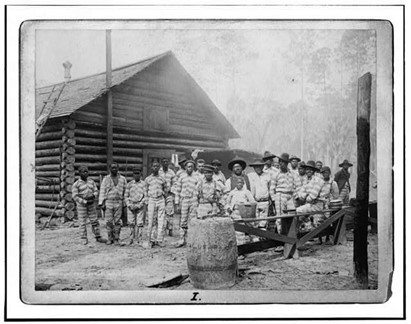
Prison Blues
Many people naively believe that Abraham Lincoln's Emancipation Proclamation of 1863 set African Americans free. However, the truth is that many African Americans in the South were trapped in a system of debt servitude known as peonage A system where an employer compels a worker to pay off a debt with work. , which was just as bad if not worse than slavery. After the Civil War, the cash-strapped South needed to restore its economy and resorted to the system of sharecropping to compensate freedmen for their work. However, in 1865 and 1866 Southern lawmakers enacted the Black Codes .
This system of social control required African Americans to provide cheap labor and kept them in a subordinate place within society. Despite Amendment XIII of the U.S. Constitution Section 1, which states, "Neither slavery nor involuntary servitude, except as a punishment for crime whereof the party shall have been duly convicted, shall exist within the United States, nor any place subject to their jurisdiction," this system thrived in the South. The term "involuntary servitude" in the amendment above was not clearly defined until United States v. Kozminski (1988) when involuntary servitude was formally outlawed.
The peonage victims' songs continually blur the delineation of sacred and secular work songs. Essentially, the same elements that gave origin to sacred songs are present in secular work songs. One such song in the video "The Murderer's Home", is nothing more than an early field holler performed a century later:

The Murderer's Home
Prison Songs
The music in the video "The Murderer's Home" uses the harmonica as an accompanying and call-and-response instrument. The harmonica is a relatively common feature throughout the genre, not only because it is conveniently sized and relatively easy to play but because there is something unique in the timbre of the harmonica that complements the mawkishness of the blues:
The St. Louis Blues
I got them Saint Louis Blues
just as blue as I can be
He's got a heart like a rock cast in the sea
Or else he wouldn't have gone so far from me
Bo-Weavil Blues
Hey, bo-weavil, don't sing the blues no more
Hey, hey, bo-weavil, don't sing the blues no more
Bo-weavil's here, bo-weavil's everywhere you go






